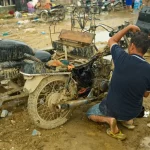BEIRUT: As Lebanon accused Tel Aviv of many ceasefire violations, Israel said Thursday that it had carried out an airstrike in south Lebanon, breaking the truce that had been in effect for a day.
Citing airstrikes and raids on Lebanese land using “various weapons,” the army claimed that the Israeli opponent had repeatedly broken the agreement.
Under the terms of the truce, only the army and UN peacekeepers are allowed to remain in the southern part of the country, where Lebanon sent troops and tanks on Thursday.
Without moving into regions where Israeli soldiers were still present, Lebanese army forces were “conducting patrols and setting up checkpoints” south of the Litani River, according to a source in the army.
According to a BBC report, the IDF is working to create a “military divide” across northern Gaza in order to isolate it from the rest of Palestinian territory.
Nazih Eid, the mayor of Baysariyeh in south Lebanon, told AFP that a strike had struck a section of his town, despite the Israeli military’s allegation that it targeted a facility used by Hezbollah to store mid-range rockets.
He claimed that “they targeted a forested area not accessible to civilians.”
According to Lebanon’s official National News Agency, two persons were injured by Israeli fire in a border village earlier on Thursday.
Destruction
Although the end of the war was welcomed in Lebanon, the nation will need time to heal.
After fleeing their homes during the conflict, tens of thousands of Lebanese have returned to their damaged towns and villages.
Umm Mohammed Bzeih, a widow who fled the southern village of Zibqin two months ago with her four children, stated, “We are happy to be back despite all the destruction and the sorrow.”
She scooped up the broken glass and debris that covered the floor, clearly fatigued, and remarked, “I feel as if our souls have returned.”
Residents of Qlayaa, a border village, celebrated the arrival of Lebanese soldiers by throwing flowers and grains.
A World Health Organization official expressed hope on Thursday that, should the ceasefire hold, some of the medical facilities in Lebanon that had been closed for more than a year will soon reopen.
Following a damage assessment this week, WHO representative in Lebanon Abdinasir Abubakar stated in an online press conference that while some of our hospitals will likely require some time to recover, others will likely be able to resume operations shortly.
He continued by claiming that four hospitals in and around Beirut were among those that might promptly resume operations, adding, “So we are very hopeful.”
Israel’s partition of northern Gaza
Separately, Israel was drawing a new military border in Gaza to divide the far north of the strip from the remainder of the Palestinian enclave, according to a BBC Verify report that was released on Thursday.
According to the report, satellite imagery seemed to depict troops occupying and removing a region spanning the whole width of northern Gaza. Hundreds of structures had been destroyed between the Mediterranean Sea and the Israeli border, primarily by deliberate explosions, according to satellite photos and videos.
Additionally, pictures display Israeli vehicles and troops positioned on the other side of the new barrier. According to analysts, the pictures imply that Gaza is being divided into different areas.
The satellite photographs indicated that Israel was getting ready to prevent Palestinian civilians from returning to the north Gaza governorate, according to Dr. H A Hellyer, a Middle East security specialist with the Rusi think tank. According to the UN, over 100,000 Palestinians have already been forced to leave Gaza’s far north.
It appears from the images that two lengthy road segments on either end of the strip are joined by cleared land that passes through an urban neighborhood. Since early October, there has been a noticeable pattern of buildings being demolished between the two road segments.
The cities of Jabalia, Beit Hanoun, and Beit Lahia in north Gaza are separated by this division, which runs roughly 5.6 miles (9 km) from east to west across Gaza.
On November 20, the UN added that “almost no aid” had reached some areas of the North Gaza governorate in 40 days. On November 26, a spokeswoman claimed that the embargo was causing Palestinians to “face critical shortages of supplies and services, as well as severe overcrowding and poor hygiene conditions.”








